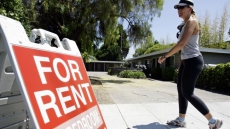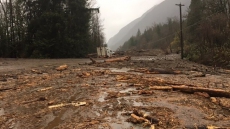MONTREAL — Visible minorities, particularly Arabs and West Asians, feel less safe walking alone in their neighbourhoods after dark than do other Canadians, according to a Statistics Canada survey released Tuesday.
The study was conducted with data collected in 2014.
Forty-four per cent of respondents who identified themselves as belonging to a visible minority group said they felt "very safe" walking home alone after dark, versus 54 per cent for other Canadians.
Stats Can noted that the majority of visible minorities in the country live in large cities, "where feelings of safety are relatively low."
"Yet even after taking into account where they lived, visible minorities remained less likely to report feeling safe than their non-visible minorities counterparts," the agency said.

Out of all the visible minority groups in the country, Arab and West Asian respondents were the most likely to say they felt unsafe.
Fifteen per cent of Arab respondents said they did not feel safe walking alone as did 16 per cent of West Asians.
"This marks a change when compared with perceptions of personal safety 10 years earlier, when the sense of safety felt by Arabs and West Asians was comparable to that of other visible minorities," the report said.





